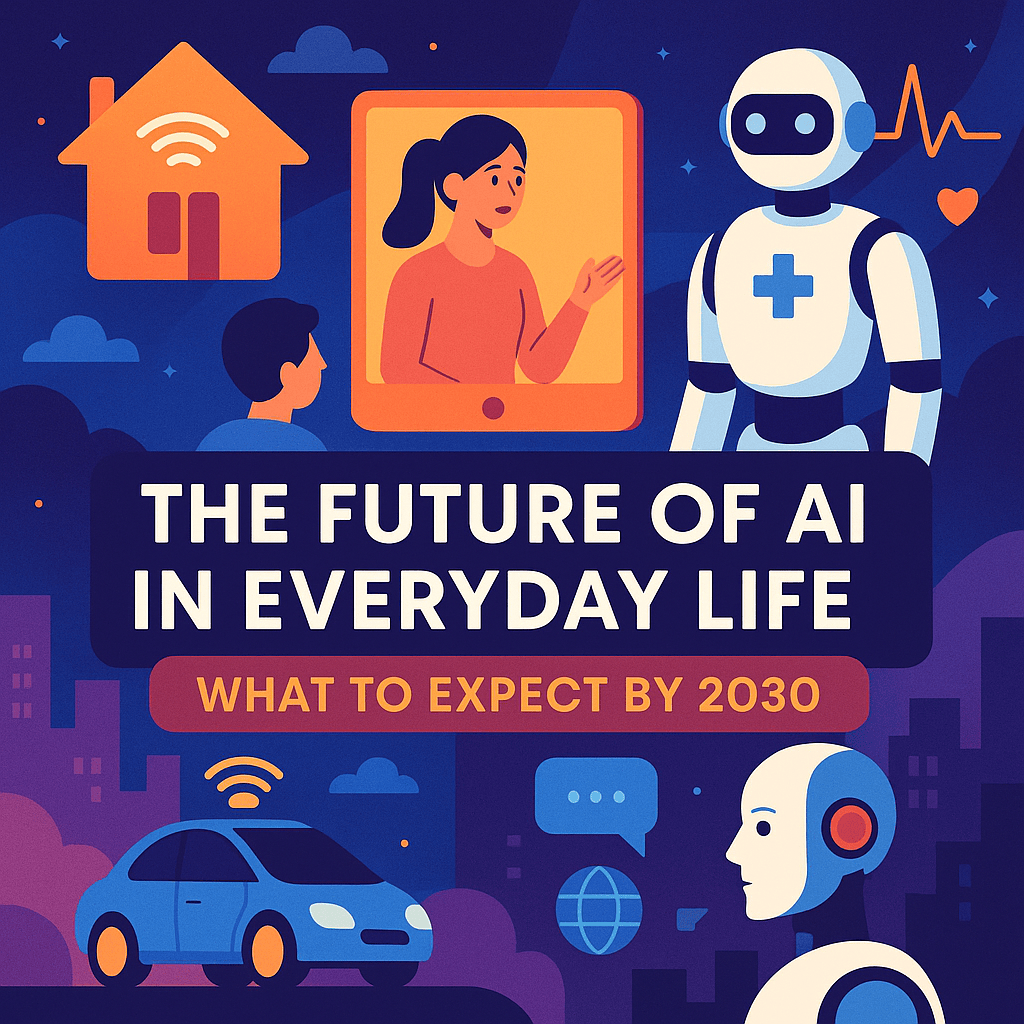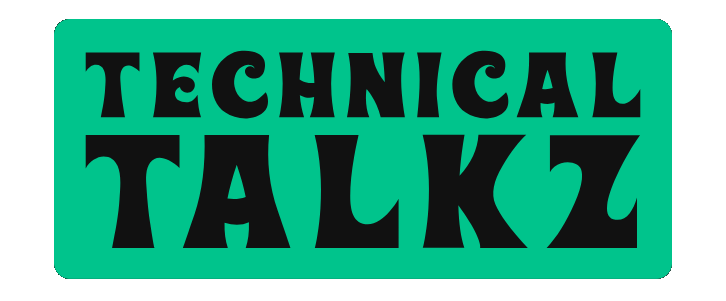Introduction: Living with AI – Not a Sci-Fi Dream Anymore
Just a few years ago, artificial intelligence (AI) felt like something out of science fiction — a futuristic idea reserved for Hollywood movies or tech labs. But today, AI is already helping you get directions (Google Maps), finish your sentences (ChatGPT), unlock your phone (face recognition), and even suggest what to watch next on Netflix.
Now imagine what AI could do by the year 2030. Think bigger: self-driving taxis, AI doctors, personalized education tutors, and even AI assistants that know your preferences better than your best friend.
In this blog, we’ll explore how AI is expected to impact and integrate into everyday life by 2030 — with predictions, real-world applications, ethical concerns, and what it means for you.
📱 1. AI at Home – Smart Living, Smarter Homes
By 2030, smart homes will go far beyond smart lights or voice-controlled speakers.
🔹 Smart Appliances That Think
- Your refrigerator will detect what’s running low and order groceries automatically.
- AI-enabled ovens will cook meals based on your health goals.
- Smart mirrors could scan your skin and recommend skincare routines.
🔹 Predictive AI for Daily Routines
- AI will learn your behavior and automate everything from lighting to climate control.
- It may preheat your shower or brew your coffee just as you’re about to wake up — without you asking.
By 2030, your home will likely be your most personalized AI hub.
🧠 2. AI in Education – A Personalized Learning Revolution
AI is already shaping education. But by 2030, expect a major overhaul in how students learn.
🎓 Tailored Learning Paths
- AI tutors will customize lessons based on a student’s pace and learning style.
- No more one-size-fits-all education. Each student gets their own curriculum.
🧑🏫 Teachers with AI Assistants
- Teachers will use AI to analyze student performance and spot learning gaps.
- AI can help generate quizzes, summaries, and even interactive visuals instantly.
🌍 Global Learning Access
- AI translators and virtual classrooms will enable rural or underprivileged students to get high-quality education in any language.
AI could help close the education gap globally, bringing personalized learning to everyone.
🏥 3. AI in Healthcare – Doctors with Digital Brains
The healthcare sector will see one of the biggest AI transformations by 2030.
🤖 AI Diagnosticians
- AI will assist doctors by analyzing X-rays, MRIs, and blood tests faster and more accurately.
- Early detection of diseases like cancer or diabetes could become routine.
🧬 Precision Medicine
- AI will analyze your genes and medical history to recommend treatments tailored just for you.
- No more trial-and-error medications.
👵 AI for Elderly Care
- Robots with AI will help the elderly with mobility, medication reminders, and even emotional companionship.
Healthcare will be faster, cheaper, and more accurate, reducing burden on overworked medical professionals.

🚗 4. AI in Transportation – Driving into the Future
Self-driving vehicles are no longer futuristic—they’re being tested worldwide. But by 2030, they’ll likely be part of your daily commute.
🚘 Autonomous Vehicles
- Self-driving taxis will dominate urban transport in major cities.
- Your car will become your personal assistant: choosing music, finding routes, and even alerting you if you’re stressed.
🛣️ Smart Traffic Systems
- AI will control traffic lights based on real-time data, reducing traffic jams and accidents.
- AI-enabled drones could be used for emergency deliveries or surveillance.
🛩️ Flying AI?
- Urban air mobility (UAM) is under development — think flying taxis managed by AI.
💼 5. AI in Jobs – Threat or Opportunity?
By 2030, many fear AI will take jobs. Yes, some roles will disappear, but new ones will also emerge.
📉 Jobs at Risk
- Data entry, telemarketing, basic customer support, and repetitive factory work are likely to be fully automated.
- Even some aspects of journalism, law, and accounting are being done by AI tools already.
📈 New Job Opportunities
- AI ethics officers, prompt engineers, AI trainers, and robot maintenance experts will be in high demand.
- Creative and strategic roles will become more important than ever.
💡 Working with AI
Most professionals won’t be replaced — they’ll work with AI. Imagine a marketer using AI to create ad content or a lawyer using AI to scan legal documents in seconds.
🏙️ 6. AI in Smart Cities – Safer, Cleaner, and More Efficient
🏗️ Urban Planning
- AI will help design eco-friendly, optimized cities using data from sensors, satellites, and cameras.
- Construction sites will use AI-powered robots and drones for faster, safer builds.
🚓 Public Safety
- AI-powered surveillance (with privacy protections) could spot crimes before they happen.
- AI will be used for disaster response, crowd control, and emergency resource allocation.
♻️ Sustainable Living
- Smart grids, energy-efficient buildings, and AI-managed water systems will be common.
Cities will become more intelligent and sustainable, reducing waste and improving quality of life.
💬 7. AI in Communication – Language No Longer a Barrier
By 2030, real-time AI translators will allow you to speak any language on a video call — instantly.
🌐 Breaking Language Barriers
- AI will translate speech and subtitles in real-time during global meetings or YouTube videos.
- Messaging apps will auto-translate texts into your preferred language.
🤖 Emotional AI
- AI will detect tone, emotion, and sentiment, improving how businesses respond to customers or how therapists track mental health.
This could redefine human connection — across cultures and languages.
🛡️ 8. Challenges of AI – Ethical and Privacy Concerns
⚖️ Bias & Discrimination
- AI can inherit biases from the data it’s trained on.
- Regulations will be needed to ensure fairness and accountability.
🔐 Data Privacy
- With so much personal data collected by AI, privacy concerns will grow.
- Expect stronger encryption, decentralization, and AI governance.
👁️ Surveillance Society?
- Smart cameras and facial recognition raise concerns about a surveillance state.
- The balance between safety and freedom will become a heated debate.
We must build AI that is transparent, ethical, and inclusive.
🧪 9. Future Innovations – What's Beyond 2030?
Even though we’re talking about 2030, some projects could extend beyond that:
- Brain-computer interfaces (like Neuralink)
- Fully sentient AI companions
- AI that creates its own AI (AutoGPT)
- AI-powered space missions and Mars colonization
It’s the tip of the iceberg — and the future could be more exciting than we imagine.
✅ Conclusion: Embrace the AI Future, Don’t Fear It
AI isn’t coming — it’s already here, and by 2030, it’ll be part of everything: our homes, schools, hospitals, jobs, and even relationships.
Will there be challenges? Yes. But if we build it responsibly, AI can make life easier, healthier, and more meaningful.
So whether you’re a student, business owner, freelancer, or just a curious human — it’s time to learn how to work with AI, not fear it.
The future is not about man vs. machine, but man enhanced by machine.


